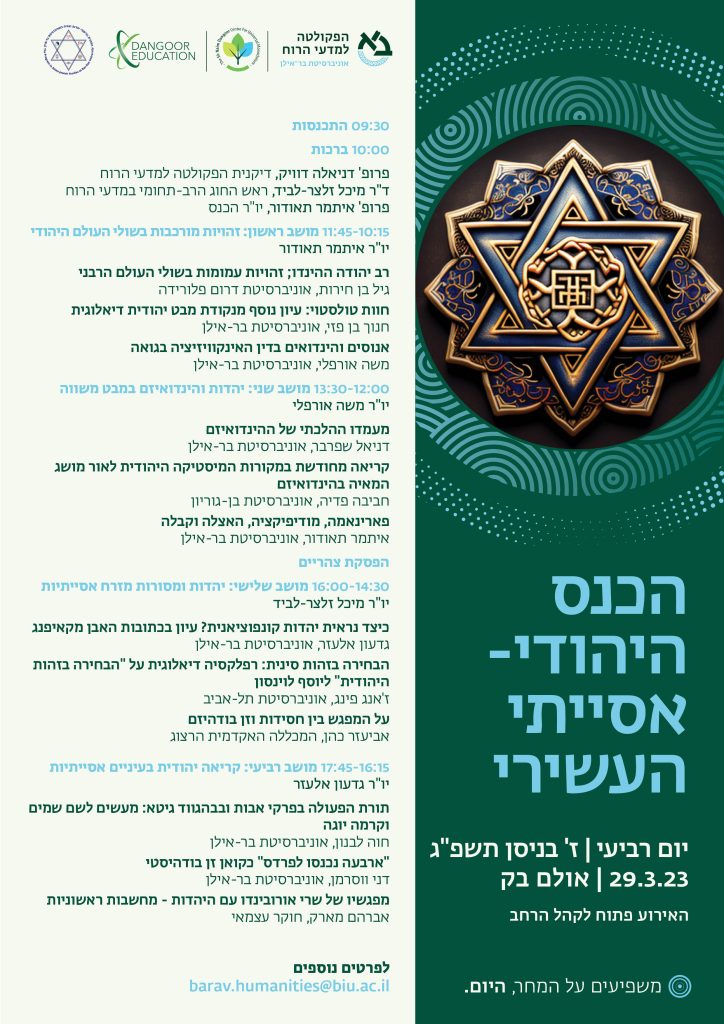Thursday, 29.3.2023
On Wednesday, March 29th, the 10th Asian-Jewish conference took place at Bar-Ilan University, with distinguished researchers participating. In her greetings, the Humanities Faculty Dean, Prof. Daniella Dueck, highlighted ancient connections between Judaism and ancient India.
Rabbi Prof. Daniel Sperber said: “The big change came about in 2007 when I was invited to participate in an interreligious dialogue with, inter alia, Hindus in New Delhi. This was the beginning of the Hindu-Jewish Commission, a framework of dialogue between representatives of the Israeli Chief Rabbinate and representatives of the Hindu Dharma Acharya Sabha, under the leadership of that remarkable personality Swami Dayananda Saraswati. This meeting was entitled The Hindu-Jewish Leadership Summit. It took place on Feb. 5-7, 2007, and was an initiative of the World Council of Religious Leaders, directed by its wonderful Secretary General, Mr. Bawa Jain”.
Following this, Prof. Sperber spoke of the Halachic status of Hinduism and argued that examining Hinduism from an Eastern logic, as opposed to a Western one, Judaism and Hinduism seem to be much closer than what is generally perceived. Prof. Hanoch Ben-Pazi looked at Gandhi’s Tolstoy Farm from a Buberian perspective and raised the question of whether it is time to perform a social experiment based on these ideas. He identified three philosophical principles at the foundation of Gandhi’s political doctrine: first, Seeking the Truth: Satya and Satyāgraha. Second, Self-rule: Swaraj and last, Non-violence.
These principles join to constitute a stance that must be understood philosophically. Despite the great interest that has been taken in Gandhi as a leader, his political doctrine, and his intellectual biography; I believe that there is still a need for systematic philosophical work to enable a coherent look at his ethical-philosophical position. Prof. Gil Ben-Herut who came all the way from Florida to participate, highlighted the obscure personality of Rabbi Yehuda the Hindu, a Hindu convert to Judaism who is mentioned in the Talmud along with fantastic stories which resemble Puranic narratives.
Prof. Ithamar Theodor drew connections between Kabbalah and theistic Hinduism, and argued that Medieval Vedānta has been divided into two major worldviews; pariṇāma-vāda and vivarta-vada. The pariṇāma-vādins maintained that the world is a transformation or development (pariṇāma) of ultimate reality (Brahman), whereas the second group, the vivarta-vādins held that the world is a false appearance (vivarta) of ultimate reality.
In many ways Kabbalah is similar to pariṇāma-vāda as it holds a similar concept according to which, divinity descends into the world through transformation, thus enabling human beings to encounter the divine reality through mind and matter.
Prof. Ithamar Theodor
This lecture highlighted two such similarities, in the realm of ontology and in the realm of ethics. In the realm of ontology, a central concept of Kabbalah is that of the sefirot which is often depicted in anthropomorphic terms; this concept is similar in various ways to the ‘Virāṭ Puruṣa’, a Vedic concept of a Universal Person, which receives a theistic interpretation by the Bhāgavata Purāṇa. In the realm of ontology, the ethics of “Mesilat Yesharim” by the Ramhal is compared to the Bhagavad-gītā’s ladder of ethical actions, as depicted by Viśvanātha.
Prof. Haviva Pedaya spoke of the notion of Illusion in Hinduism and Hasidicism, Dr. Gideon Elazar described the Sinicization of the Kaifeng Jewish community and Ms. Hava Levanon spoke of similarities between Pirkeh Avot and the Bhagavad Gita. The conference organizer, Ithamar Theodor said that this field of Asian-Jewish studies has not only great academic potential but also comprises an important contribution to cultural diplomacy, creating friendship and fraternity between Judaism and Asian Nations.



